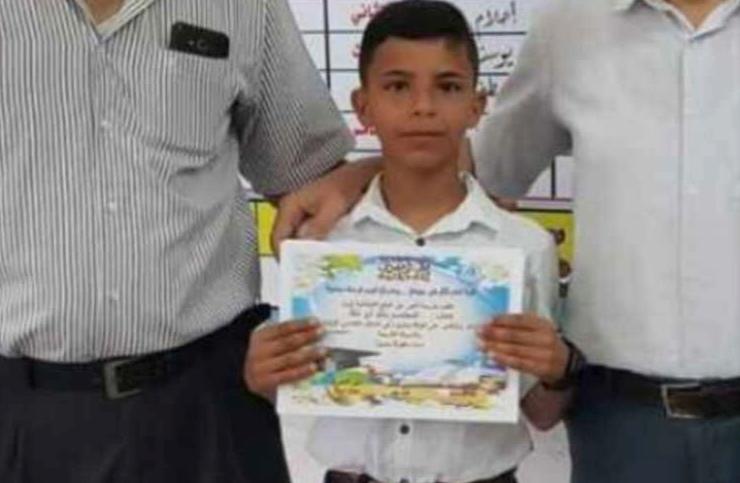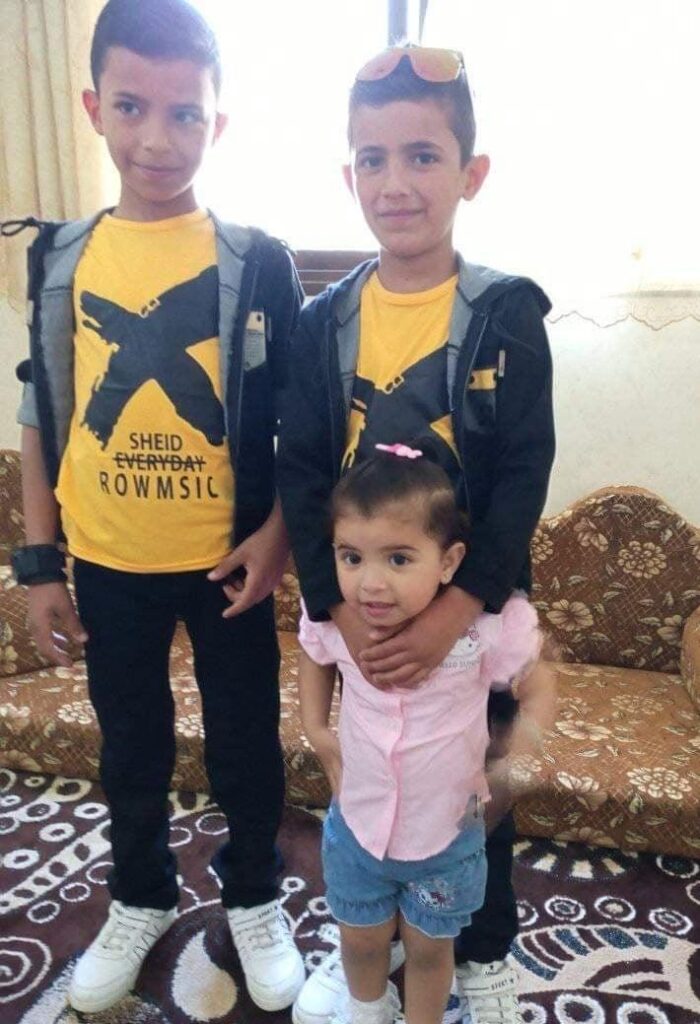My martyred cousins, Mutassim and Sewar


“He is my first child and my first joy,” Mutassim’s mother said, holding her 13-year-old child, her heart squeezing painfully. Mutassim was an intelligent, calm, ambitious boy, loved by everyone.
About three months ago, Mutassim had been accompanied by his brother and his soul mate Radwan when Israeli warplanes bombed a house they were passing by. Mutassim was slightly injured and Radwan was moderately injured. The two brothers survived this bombing, and they stayed next to each other at all times, Mutassim and Radwan, like two bodies with one soul.
Mutassim was the eldest of his siblings, and he was more afraid for them than he was for himself. He’d wake up in the morning and take his brother to sell cheese, so they could learn how to earn a living from the sweat of their brows. It was a simple, quiet life.
On the evening of March 13, 2024, when Ramadan was in its first days, Mutassim, Radwan, and seven-year-old sister Sewar helped their mother clean up after they finished eating. About an hour later Mutassim went to his room to pray and read Qur’an while his family stayed in another room. At exactly 8:30 p.m., the Zionist forces bombed the house where they lived. It was completely destroyed.
A child alone under the rubble
I haven’t forgotten the look of my father when he found out that his brother’s house had been targeted. He hurried and found his brother’s house converted to a pile of rubble. Because of the lack of equipment, they could only get out my uncle, his wife, and Radwan. Mutassim and his sister Sewar, who was sleeping at the time of the incident, remained under the rubble.
Hours later they managed to get Sewar out, but Mutassim remained alone under the rubble, fighting death. My father kept looking, and heard a moaning sound coming from somewhere. It was Mutassim, calling in a faint voice. My father told him not to be afraid, that they would rescue him.
But fate had another idea. Mutassim’s voice began to fade until my father was sure that Mutassim had died, suffocated by the rubble and stones above him.
I think a lot about how his condition was between those stones. Did they hurt him? Did he cry? Was he tortured? There are many questions, but I hope with all my heart that he died without feeling any pain.
After Mutassim stayed an hour alone in the dark struggling, my father and others finally managed to pull his body out of the rubble. His face was swollen, blood was flowing from his ears, and his left leg was broken. My father tells us, “That image of him has not left me for a moment.”
Imagine how it feels holding the body of a dead child in your hands. They took Mutassim to the hospital to be shrouded and buried. Mutassim was lucky that he was buried and prayed for, because most of the martyrs here in Gaza are not buried and remain on the street or under the rubble until their pure bodies decompose. At least Mutassim went to meet his Lord while reading Qur’an. What a beautiful meeting that must have been.
How do you tell the parents?
Mutassim’s father, mother, and siblings remained in the hospital and did not realize that Mutassim had been martyred. When they asked about him, no one was able to tell them the truth.
My uncle, Mutassim’s father, was in very bad condition, unable to move. His wife was in better condition. Radwan had a moderate injury, but Sewar was in intensive care.
The day after the tragedy, my father decided to tell Mutassim’s mother and brother about Mutassim. This was the most difficult part. How would he tell a son’s mother that he no longer exists? How would he face Radwan and say that sentence to him? How would the news affect them?
When my father told them the news, it struck them like a thunderbolt. Mutassim’s mother started screaming and crying, “My first joy, the quiet son that everyone loved, is no longer here.” How could this grieving mother absorb such news?
Radwan did not speak a word when he learned the news, the shock was so great. My father did not dare to tell the news to my uncle because his condition did not allow it, but my uncle heard my father and grandfather whispering that he should know the truth. He found out, and his condition worsened. He kicked everyone out of his room to cry over the pain of the separation from his son.
My uncle was always asking about Sewar, but they lied to him that her health was good. In fact, Sewar remained in intensive care after suffering for two months, then she also became a martyr. The pain became double after my uncle lost his two children both. How can his heart accommodate all this sadness and pain?
A brother’s disbelief

One day my father went and found Radwan alone crying. He looked at my father and said, “Were Mutassim and Sewar really martyred?”
How can these children forget? How can a brother forget his brother and forget all their days, their games, their laughter, their fights together? What a despicable occupier, to kill the innocence of these children and rob them of their rights. Radwan explains what they lived that night. “We were at home when we saw a bright light, followed by the sound of a loud explosion.”
Then he said, “Why did we hear the sound? Since we were little, my mother used to tell us, ‘The rocket that’s going to kill you, you won’t hear its sound,’ but what happened is the exact opposite. We saw and heard everything, was it a lie? Why didn’t I die with Mutassim and Sewar? Why did they go without me? Why did they leave me and choose to go together? Wasn’t I a good brother? Mutassim wanted to grow up and run a big company. We always dreamed together and planned everything together, but why are they leaving me now alone, struggling with memories?”
I have only memories left of them. Even their clothes were burned in the bombing and there is no trace left of them. I want to wake up from this terrible nightmare. Why are children killed before they start their lives? Why is it forbidden for them to live like other children?
One story, but a story of thousands
Does the world understand what is happening to the children of Gaza? Why do they have to live all these tragedies when they should be able to grow up and open their eyes to life? The story of Mutassim and Sewar is a story of thousands of other children endlessly suffering, children who lose the meaning of childhood and grow up quickly, before their time.
Have you ever thought that if all this hadn’t happened to Mutassim and his family, where would they be now? For a moment you might think you are in a movie, but what is transmitted over the internet is a small part of what children live here.
Isn’t it time for Palestinian children to grow up naturally? Don’t they have a right to be safe?
Until when will the world consider us only as numbers? We have the right to live, we love life. We want a quiet life where we can live in peace, where children can enjoy their childhood, go to school, and play with their friends.
Even the children want to explore the world and know everything about it. Is it too difficult to achieve what they want?














